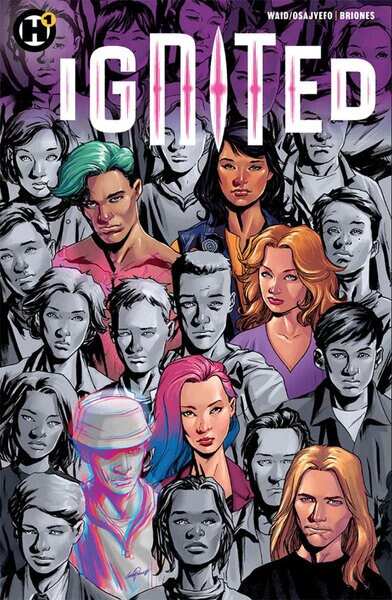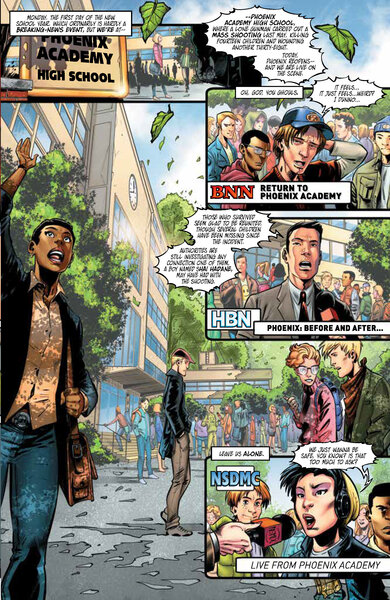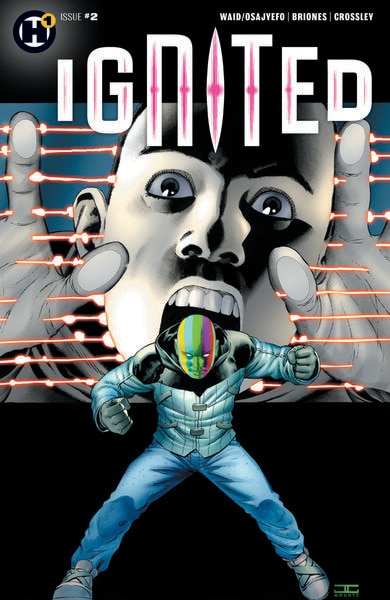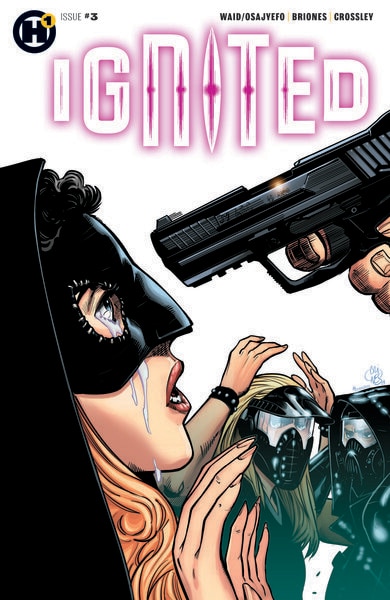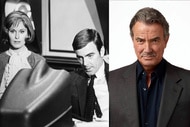Create a free profile to get unlimited access to exclusive videos, sweepstakes, and more!
Indie Comics Spotlight: Mark Waid and Kwanza Osajyefo make gun violence the supervillain in Ignited
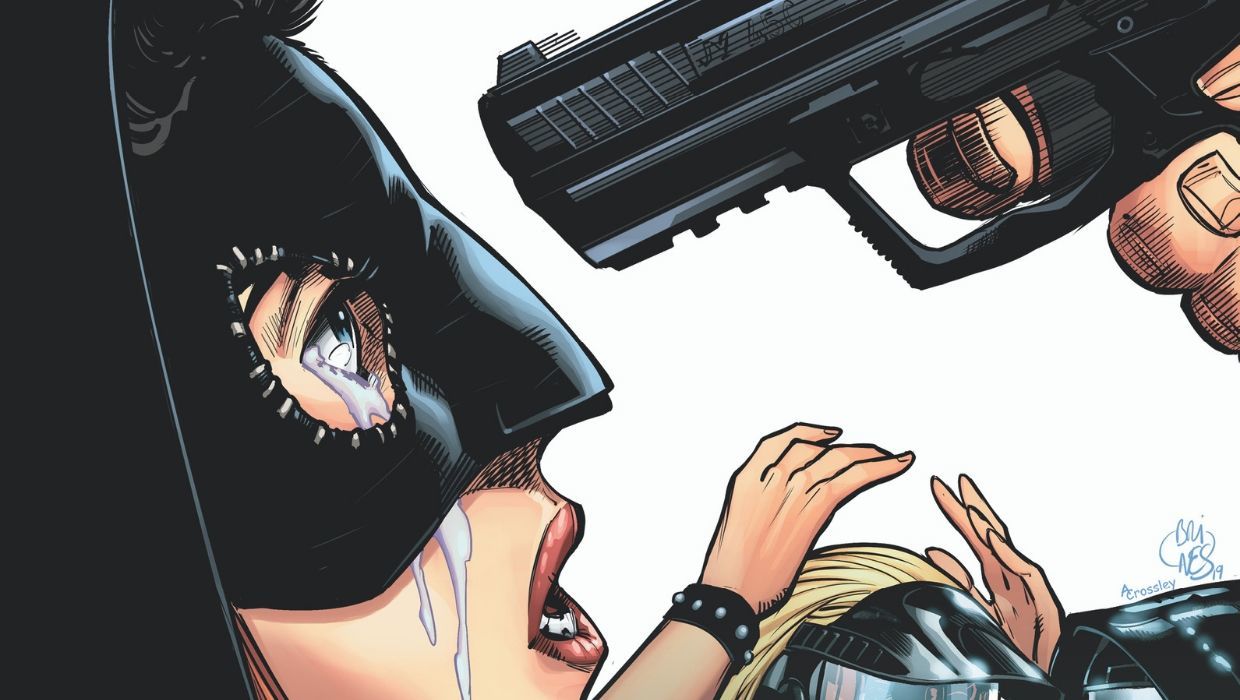
L.A.-based publishing company Humanoids has made it its business to push boundaries and challenge the status quo ever since the 1970s. Along the way introducing the world to visionary talents like Mœbius, Alejandro Jodorowsky, and Philippe Druillet and work like The Incal and Heavy Metal. And while the company hasn't traditionally played in the monthly caped crusader space, leaving it to DC and Marvel to dominate, this is changing.
Last year, CEO Fabrice Giger announced that Humanoids was getting into the monthly comics game with a new imprint called H1. The new imprint is guided by big-name "architects" like CCO John Cassady (Planetary, Astonishing X-Men) and Director of Creative Development Mark Waid (Kingdom Come). Kwanza Osajyefo (BLACK AF), Yanick Paquette (Wonder Woman Earth One), and Carla Speed McNeil (Finder, Sensation Comics) round out the fledgling imprint's creative leadership team.
H1's connected universe launches this year with three series: Ignited, Strangelands, and Omni. The first of the series, Ignited, which is co-written by Waid and Osajyefo and illustrated by Phil Briones, dropped on June 5. The series focuses on students who return to their re-opened school after a recent shooting there left several students and faculty dead. The kids are coping with trauma, the press, and, for six of them at least, new superpowers. Following an "ignition event," the six begin using their powers to fight for good, a tall order complicated further by the fact that the supervillains in this story are politicians, the press, and even their parents.
SYFY WIRE spoke with Waid and Osajyefo to find out why they decided to launch with such an incendiary topic as gun violence and how they are aiming to include stories from actual school shooting survivors.
How did you both become involved with H1?
Kwanza Osajyefo: Fabrice Giger contacted me and gave me the pitch on what he wanted to do with H1, and it just sounded like something exciting to me. I don't even think he had approached anybody else yet. He knew the kind of work that I like doing, stuff that has a true purpose and storytelling that's not part of a significant legacy brand. It's about really telling stories that have a lot of emotion and gravity to them. And that was kind of how it started. And then Yannick and Carla joined us and we hashed out the entire blueprint for H1.
Mark Waid: For me, it was a combination of Humanoids looking for someone to come on board this book with Kwanza and the fact that this is such a passion project for me. This specific topic that we're dealing with in this one book, in particular, is such a big thing with me that I just jumped on it like black on a bowling ball when I heard about it.
How did Fabrice and the rest of the Humanoids team react when you told them you wanted to do a story about school gun violence?
Osajyefo: They accepted that out of the gate, and it's fantastic because often people complain about working with publishers and having their ideas kind of go through the mill. But this story is one of the things that was coherent from the beginning and stayed true the entire time. Of course, some characters change because plot points shift and stuff like that, but the [gun violence] being like the catalyst for Ignited has always been there.
Will the kids in Ignited be connected to or show up in other H1 comics?
Waid: That's not the plan immediately; we're trying to tread the line very carefully between what you'd expect from a new launch and trying not to force-feed an entire universe down the throats of the readers. The "Ignition" power encompasses the things that are happening in this world as a backdrop across all three series. Of course, we would love to buy all three, but if you feel like buying Ignited or Omni or Strange Lands separately, that's fine too. You won't miss anything, but you will get more out of it if you read all three.
The first issue of Ignited is narrated by a character named Anouk. Is this her story? Or is every issue going to have a different narrator?
Osajyefo: Anouk is kind our narrator throughout the whole story because she has a point of view that I think aligned a lot more with the reader in terms of coming into this universe. Her life has already been dramatically changed by [the shooting] that happened at Phoenix Academy before the beginning of the book. Now that the ignition abilities come into play, she's helping ground things from in reality. Our ethos for the entire line is to go by the same rules as our reality does.
The adults in this story have a decidedly different take on things. Many want to arm the teachers. How important was it to show that side of the gun control debate?
Waid: Neither Kwanza or I am interested in watering the kids' [experiences] down. But to make it feel real, not everyone in the series thinks the same way. Not everyone has the same point of view on how to cope with gun violence, and that's why the parents play here so nicely.
You've mentioned that you include stories from kids who are real-life survivors at school shootings. Can you expand on that?
Waid: We've reached out to victims of these domestic terror attacks at schools and have opened up the editorial pages to let them tell their stories or give us some sense of what they think should happen in ours. We're opening up that wide to those kids. For me, this idea came out of another school shooting in Colorado a couple of months ago. And at the vigil, all the kids just got up and walked out because they felt politicians and the administration made it all about them. That was the flashpoint for me (no pun intended). I just realized that as much research that we're doing on the actual kids and the actual incidents, the real survivors deserve to have their voices heard. So this is a perfect place for it.
Did you consult with victims of a school shooting when writing this story?
Waid: I did talk to kids, and I'm sure Kwanza also spoke to people who have dealt with this sort of thing. So neither of us was interested in this book from a remote point of view. If you're going to do it, be authentic. Do the research, do the homework. Read David Hogg's book. Listen to Emma Gonzalez and what all these other kids have to say. Their input and insights are a part of this book.
Invariably there will be critics who feel that you're trying to profit off of pain. How do you strike that balance between authenticity and pandering?
Osajyefo: It's more about telling a story that reflects, you know, our reality. So often the [real-life] stories that are out there shift so quickly away from the victims and onto the shooters and politicians. That's why, when the conversation shifts to "thoughts and prayers" or "it's too soon to talk about gun control," it's just offensive. It's not too soon for the survivors. It's not too soon for the parents who lost their children. It's not too soon for the children who lost their lives.
To me, even if it's just through like a comic book or sci-fi story, if there's something out there that reflects even a sliver of the real people who this is affecting, that's something important to articulate.
Is Ignited in opposition to stories like The Punisher or John Wick? Or are they two sides of the same conversation that we're not having?
Waid: This is about consequences. This is as much about effect as it is about cause. These kids aren't wearing capes and cowls and "punching criminals." They're going to take action against the people and the forces that make this kind of crap possible and predictable in our world. And they're pretty quickly going to meet with real-world-level push back. Ignited isn't a story where some supervillain is going to come in and adopt them as part of the cause or anything like that. This is what would happen if kids had these abilities and we're able to push back.
Why not make these kids superheroes who save everybody?
Osajyefo: The idea of a superhuman trying to do right or wrong but "Wait, let me put on like a leotard first before I do anything," that's not grounded in reality. Which is what we're trying to do here. When you think of your everyday hero, like the kid who stopped the Colorado shooter or the guy who got his hand injured [in the Waffle House shooting]. Or ordinary police officers, firefighters, or EMTs who step in when somebody is being hurt or harmed. That's the [mindset] of these kids. Except that they have powers.
Waid: Given the success of, of the Marvel movies and so forth, people still sometimes tend to forget that comics are a medium and not a genre. Just because people have extraordinary powers doesn't make them superheroes per se. In our case, it just makes them activists.
So your focus is really on the kids, even though sometimes the loudest critics of the medium seem to be their parents.
Waid: Yeah. The reality of it is if you're working for Warner Bros./DC or if you're working for Disney/ Marvel, as wonderful as those places are, there's a limit to how real you can make these stories because you're dealing with corporations, who can't afford to move the needle and can't afford to rile people up. But Humanoids has given us the runway to tell some pretty gritty and dangerous stories.
